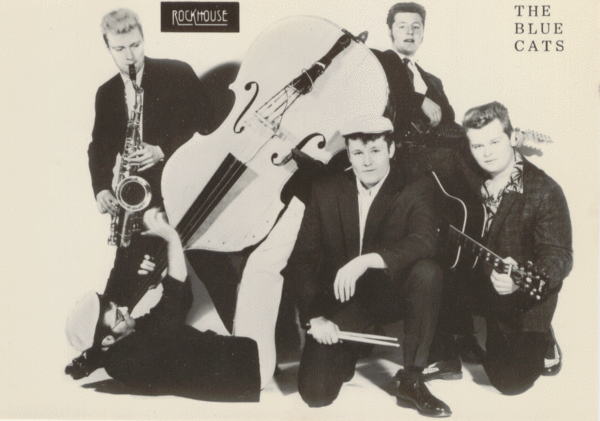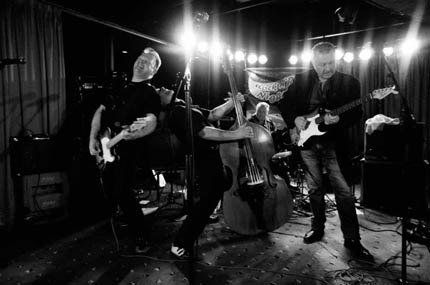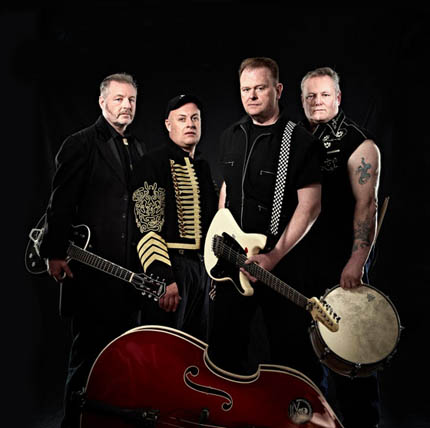| Clint Bradley
Twenty years have passed since the Tunnel. Why, and how, did you decide to get together again? How did you feel when you started playing together again?
It was electric; a real buzz, like we’d stepped out of the room for a cup of tea, and stepped back in 16 years later. We had not seen or spoken to each other for 16 years or so, when the opportunity arose to play The Hemsby festival. A good deal of soul searching took place on my part before that gig took place, but it happened and was a great success. We’d only really intended to do the one gig, have a laugh and rebuild bridges, but we enjoyed it so much that we decided to try writing together again and look at the possibility of maybe doing some more gigs. The creative spark was very much alive between us again. I’d been off doing my own thing with my solo career and my soundtrack business, and Carlo and Stef had been doing theirs. So we’d quite forgotten how much of a spark there was when we played together. But it has to be for real, for a reason. It’s no good us just getting up there for a gig or two, we have to race to win or it just won’t work.
You also have a new double bassist, namely Steve Whitehouse of Frenzy, the Sharks and Restless fame. How did you get in touch with him?
We had a logistical problem in that Paul Diffin now lives full time in Atlanta USA with his family; I was also still travelling backwards and forwards to the States working on various projects . With the air fare being the thick end of £1000 a time, it sort of left us with a problem. It was decided by all of us that it couldn’t work and that another UK bass player would have to be found. Though Paul and I continue to work together on my solo projects. This was a very amicable decision. I’d seen Steve around over the years and had always been very impressed with his playing and his sound. Also I really liked what he’d done with Frenzy, and the fact that he like me, didn’t cave in to the pressure to toe the line if he believed in something. I remembered seeing him at Beltane Fire gigs and also saw him play in Germany during the 90’s. Playing With the Blue Cats is quite demanding musically, you need to have a firm understanding of the musicality of stuff as well as the strength and power, Steve has both which is perfect for us. The first song we played together in the rehearsal studio was Gotta Go, and what can I say, it was musical Nirvana, A PERFECT UNION! He fits in to the band a treat socially as well; he really is part of it now. Steve really carries his weight and is a total professional to work with, in short it’s a match made in heaven
Steve seems to be a natural choice. He used to cover Wild Night and Gotta Go with Frenzy. The Long Tall texans also covered Gotta Go and recently Paul Roman of the Quakes wrote Seven Seas Alone quoting Beltane Fire's Captain Blood as one of his inspiration behind it. Were you aware that the Blue Cats but also the G-Men and Beltane Fire stuff were so popular on the Psychobilly scene?
Yeah kind of, it makes sense when you think about it. We’ve always been at home with a more progressive audience which is what you tend to get on the Psychobilly/Neo Rockabilly scene. It was bloody hard work for us in the very early days before that scene existed, I mean let’s not beat around the bush here, the traditionalists didn’t like what we were doing and still don’t. I am extremely proud of the G-Men & Beltane Fire, with those incarnations we took it to another level, if we’d had a label that understood what we were trying to do with Beltane, we could have taken the whole thing to another level. Beltane Fire was years ahead of its time, but there are those that understood it from the beginning, Steve for one.
It also takes us back to Fight Back when "traditionnal" rockabillies started to drift away because of the new songs. How did you feel about that?
I’ve been reminded recently why I wrote ‘Fight Back’ in the first place and the emotions behind it. Those who were there in the beginning will remember what it was like. We had to take our own road and head down it no matter what, even when we had to deal with the music fascists within the scene, we knew what we were doing was right. Rockabilly is about excitement and energy, a moment of blissful impulse, The Elvis Sun Sessions, Johnny Burnette’ Gene Vincent and the Blue Caps, etc. Those recordings are meant to taken and savoured, the energy and soul is there because they are spontaneous moments of creative genius. They are not meant to be played over and over again note for note until you’ve worn out the vibe that was there in the first place. I always felt that if you took that spirit and influence of that and combined it with your own contemporary surroundings both musically and geographically something magical would happen. Instead of playing the same songs over and over again why not take the influence and carry it forward. Which is what we did when we first got together, we combined the spirit of Rockabilly with the attitude and feel of all our other influences, and what came out was just us. I was also becoming really conscious of the fact that I wanted to write and play my own songs, about my own culture and the things going on around me. I mean I loved rockabilly music, but I couldn’t relate to the lyrics of a lot of the songs, because they were about another youth culture from another country and time. It was people like Joe Strummer who were writing about things I understood and could see around me. We are a band of different colours, a group of musicians who love their craft and always give their best. Our audience is as diverse as we are; you have to leave all your prejudices behind when you come to a Blue Cats gig.

Early 80's, with Clive Osborne on sax and Mitch Caws on bass.
Still on Fight Back, when I listen to it, I have the feeling that there are two albums in one. One half reflects what the Blue Cats were doing at that time by pushing the boundaries with original songs like Wild Night, Fight Back etc. while the other half sounds more like the label keeping in mind the fans of the Blue Cat Trio with more traditional covers...
A very good and observation and I’m glad I can get the chance to answer that question at last. The main reason for the contrast of that record was the fact that we held a lot of new songs back because we didn’t want Rockhouse to have them, we ‘d had enough of that label by then, they’d ripped us off and had us in a corner. Songs like Gotta Go and others were already on the burner, but we didn’t want them to get hold of them. Also Rockhouse were pretty scared of our New Wave sound and kept trying to tone it down, what makes me laugh is that within a couple of years they were all at it.
Let's come back to your latest release "Best Dawn Yet". Beside the music that doesn't try to fit any genre nor category, the lyrics are also very different from your usual rockabilly band, whether it's the sea subject like Captain Blood and Billy Ruffian or Baden Hill. Tell us more about that please...
I tend to write about subjects and things I know or enjoy, I love English history and folklore and am forever fascinated by the things I uncover that are right under your nose. ‘Billy Ruffians’ came from the story of HMS Bellerophon that was a ship in Nelson’s fleet at the battle of Trafalgar. But most of the sailors in the fleet could not pronounce ‘Bellerophon’ so they gave it the name ‘The Billy Ruffian’ The story of the crew, ‘The Billy Ruffians’ has always fascinated me, they were a total mix of Nationalities, (there were 25 different nationalities in the fleet) but they all fought together under one flag, the real incentive to win the battle was the prize fund, that they would receive if they captured an enemy ship. I’d read their story many times, and one day it struck me that it was not unlike the worldwide ‘Rockabilly’ scene, so many different nationalities, all into the various different forms of the genre, Neo–Rockabilly, Psychobilly, etc. etc. yet all united in their on-going passion for that one thing ‘Great Music’ it really is like a worldwide brotherhood, people outside it never really understand it, even members of your own family, and yet when you get a group of Billy’s together in one place they are united in that one passion, the Music!
‘Badon Hill’ was the last of the 12, great Arthurian battles against the Saxons. They rode out together one last time to face what came, ‘All these years we’ve been together…’ It’s a song that is as much about our relationship with the fans as us in the band, the fans that have stuck by us all these years and championed us against all the odds. We wanted to give it that kind of ‘Johnny Cash’ feel, which I think is really synonymous with being a maverick. ‘The Blue Cats’ have always been Mavericks…

You also seemed, Carlo maybe even more, to have a lot of fun re-creating the Burnette sound on Burnette like you did with Cliff Gallup on Gallupin' Man...
Yes with ‘Burnette’ We wanted to write and play something that acknowledged the great influence that ‘Johnny Burnette’, and ‘Grady Martins’ guitar playing had on us when we were kids, especially Carlo. The same as we did for ‘Cliff Gallup’ on ‘The Tunnel’. We recorded this song in a totally different way, to try and create that wonderful sharp and ambient sound that you find on the classic recordings that Johnny Burnette did with Owen Bradley producing.
There are also two cowboy ballads. One that comes from the Son of the Pioneers and the other, an original called Lonesome Desperado that sounds like an unissued Marty Robbins song. I assume you're a big fan of Robbins. Tell us about your other influences.
Yes indeed my first and foremost influence was without doubt’ Marty Robbins’. I was fortunate in that my dad and my uncle were both into western music so I had a fairly good record collection to rifle through when I was a kid. I can still remember the first time I heard Marty singing Big Iron, and it still affects me in the same way today, a hair on the back of the neck job. It was a seminal moment for me, and that’s what I sat in my bedroom trying to learn to play along to with my first acoustic guitar, I was probably around 7-8 years old at the time. Also Roy Orbison and Johnny Cash, and ‘The Sons of the Pioneers’ I thought Cash was the coolest looking bloke I’d ever seen. Then came the Clash and the Elvis sun sessions for the first time. Then it was Johnny Burnette and the Vincent Capitol stuff, the CBS rare rockabillies albums, and I was well and truly away. I also really loved that British sound, things like Johnny Kidd and the Pirates, Billy Fury, The whole Joe Meek sound and the Shadows and stuff. But At the same time there was The Jam, Generation x, the skids, Buzzcocks, the whole Ska thing with the Specials and Maddness and of course Joe Strummer and the Clash. For me it all went hand in hand, it was all about energy, working class kids giving it some, the only separation was the Atlantic Ocean, culture and time.
That leads me to your solo solo stuff. Do you have plans to re-release This Hour?
There is a very strong possibility that ‘This Hour’ will be re-released next year, which I am really pleased about. It never had a chance the first time round because the label folded before it was properly released; even so the CD’s that were pressed sold out very quickly. ‘Guilty Heart’ has received a lot of airplay in Germany and really kept the album alive. It’s an album that I really put my guts into, the songs are very personal, and though it’s very much a ballad orientated album, I’m very very proud of it. I was lucky to get to work with 3 members of Ian Durys Blockheads on that project, and I firmly believe it’s a timeless record that will one day see the light of day properly.
How do you feel about seeing it changing hands for huge amount of money on ebay?
It’s ridiculous that people have to pay stupid money for it on ebay and Amazon etc. It’s a collection of songs that I wrote for people to listen to and think about. I tried myself to re-release some time back, but gave up after threats from the publisher, I mean they’re my bloody songs, what’s the point in them just sitting there in a vault because some greedy bugger wants his pound of flesh. Negotiations are going on at present that will hopefully get it sorted once and for all. I’m also really pleased with the way ‘Cross a Soul with Silver’ turned out, that’s a real journey through my influences and the styles that have inspired me over the years, I just let then songs go where they wanted on that one.
What about your songwriting process. Do you write with the Blue Cats or your solo stuff in mind or do you choose once the song is written where it's going to end?
That’s a good question! I sometimes have an idea and think straight away, yeah that’s a Blue Cats song, even in the years we weren’t working together; I would often think man that would have really worked with the lads. Then some songs are just so personal or off the wall, I think it will work better on one of my solo albums. The thing is I’m writing continuously, it’s my life blood and where I exist, I am always buzzing about something, my problem is not always having the outlet for the materiel. Here in the realm of middle age I have to let the song go where it wants, whatever style that may be.
You also have plans for a neo-rockabilly album in the near future...
Yeah I have a collection of songs that I’ve been working on for some time now which are all very much progressive New wave Neo Rockabilly, probably more so than any I’ve done previously. What I would like to do is record that album of songs with some guest players and make it a real event.
Did a band or an album, rockabilly or not, impressed you recently?
I have to say that I’m very impressed with ‘Hank III’ I think that bloke is a major Talent and is doing something of real worth. Also it’s just the kind of kick up the ass that Nashville needs, I mean how one town could do so much to destroy such a great genre and replace with the nauseating crap that is modern Nashville is a mystery. Hank 3 does it for real in a totally unique and original way; he’s raw and powerful, full of soul and stands alone against the music Nazis out there.
The last word is for you...
Thank you to everyone for your continued support, and I promise you there are some momentous projects ahead before the guitar is finally hung above the fireplace.

|